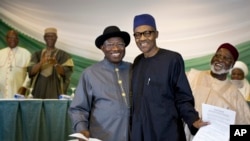Nigerians will line up at polls across the nation Saturday to cast ballots in presidential and parliamentary elections. What happens after that, however, is anyone’s guess, and some are fearing the worst.
When results in the presidential vote are announced, the biggest question may not be how will the winners celebrate, but how will the losers handle the news.
Will supporters of opposition candidate Muhammadu Buhari and his All Progressives Congress party stay calm if he loses his fourth attempt at winning the presidency? What about if voters unseat incumbent President Goodluck Jonathan and his ruling People’s Democratic Party, which has controlled the presidency since 1999?
What if the new voting procedures the electoral commission put in place don’t work, and people can’t cast their ballots? And how about Boko Haram, the Islamist extremist group that has threatened to disrupt the vote?
The northern city of Kano has borne the brunt of several Boko Haram attacks, including a suicide bomb and shooting attack at its main mosque in November. It was also the site of rioting after the 2011 elections, when Buhari supporters accused officials of rigging the vote for Jonathan. That spasm of violence left more than 800 people dead, mostly in the country's north.
Civil servant Ahmed Ibrahim said he thinks the police can protect voters but he feared partisan violence, particularly if voters heed the advice of some politicians who have encouraged people to remain at polling stations after casting ballots as a way to stop fraud.
“When you vote, just leave. You know what you vote. People know what they vote. And (election officials) are saying that there’s no way they can rig this election. So staying there can cause a lot of problems, what I’m thinking," Ibrahim said.
A Kano police spokesman said law enforcement would be shutting down roads between the states at midnight Friday and through the voting Saturday.
Hajiya Turai Ibrahim, a housewife, said she was confident these preparations will prevent any Boko Haram attacks.
"I am comfortable that the security preparations will protect voters from any of the unrest seen in the northeast, where Boko Haram is particularly strong," she said."The government has been speaking with young people to urge them to remain peaceful during the vote."
But political violence flared this week in the southern Niger Delta region. Voters in Rivers State have long supported Jonathan. But the 2013 defection of the state governor, Chibuike Rotimi Amaechi, to the opposition party has inflamed tensions.
On Thursday, gunmen tried to assassinate Amaechi as he campaigned in the state capital, Port Harcourt. His supporters accused the ruling party of being behind the attack.
In recent weeks, Port Harcourt has been rocked by a series of fatal gun battles that Sofiri Joab-Peterside, a sociology lecturer at the University of Port Harcourt, said were politically motivated.
“There are those who purchase this violence. And experience has shown that in this part of the country those who possess and control the instruments of violence also controls the processes, the electoral processes, and eventually controls the result," he said.
Jonathan and his main challenger, Muhammadu Buhari, met in the capital of Abuja on Thursday and released a joint statement, pledging to respect the outcome of the vote.
Hilary Uguru contributed to this report from Port Harcourt.











